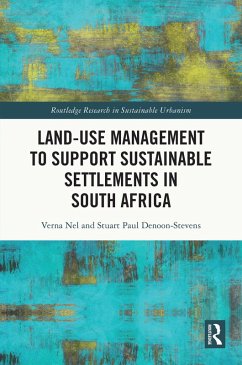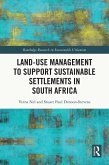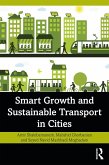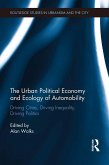Verna Nel, Stuart Paul Denoon-Stevens
Land-Use Management to Support Sustainable Settlements in South Africa (eBook, ePUB)
42,95 €
42,95 €
inkl. MwSt.
Sofort per Download lieferbar

21 °P sammeln
42,95 €
Als Download kaufen

42,95 €
inkl. MwSt.
Sofort per Download lieferbar

21 °P sammeln
Jetzt verschenken
Alle Infos zum eBook verschenken
42,95 €
inkl. MwSt.
Sofort per Download lieferbar
Alle Infos zum eBook verschenken

21 °P sammeln
Verna Nel, Stuart Paul Denoon-Stevens
Land-Use Management to Support Sustainable Settlements in South Africa (eBook, ePUB)
- Format: ePub
- Merkliste
- Auf die Merkliste
- Bewerten Bewerten
- Teilen
- Produkt teilen
- Produkterinnerung
- Produkterinnerung

Bitte loggen Sie sich zunächst in Ihr Kundenkonto ein oder registrieren Sie sich bei
bücher.de, um das eBook-Abo tolino select nutzen zu können.
Hier können Sie sich einloggen
Hier können Sie sich einloggen
Sie sind bereits eingeloggt. Klicken Sie auf 2. tolino select Abo, um fortzufahren.

Bitte loggen Sie sich zunächst in Ihr Kundenkonto ein oder registrieren Sie sich bei bücher.de, um das eBook-Abo tolino select nutzen zu können.
This book provides a theoretical and practical foundation needed to change the practice of land use management.
- Geräte: eReader
- ohne Kopierschutz
- eBook Hilfe
- Größe: 3.52MB
Andere Kunden interessierten sich auch für
![Land-Use Management to Support Sustainable Settlements in South Africa (eBook, PDF) Land-Use Management to Support Sustainable Settlements in South Africa (eBook, PDF)]() Verna NelLand-Use Management to Support Sustainable Settlements in South Africa (eBook, PDF)42,95 €
Verna NelLand-Use Management to Support Sustainable Settlements in South Africa (eBook, PDF)42,95 €![Cities, Disaster Risk and Adaptation (eBook, ePUB) Cities, Disaster Risk and Adaptation (eBook, ePUB)]() Christine WamslerCities, Disaster Risk and Adaptation (eBook, ePUB)50,95 €
Christine WamslerCities, Disaster Risk and Adaptation (eBook, ePUB)50,95 €![Smart Growth and Sustainable Transport in Cities (eBook, ePUB) Smart Growth and Sustainable Transport in Cities (eBook, ePUB)]() Amir ShakibamaneshSmart Growth and Sustainable Transport in Cities (eBook, ePUB)40,95 €
Amir ShakibamaneshSmart Growth and Sustainable Transport in Cities (eBook, ePUB)40,95 €![The City in the Experience Economy (eBook, ePUB) The City in the Experience Economy (eBook, ePUB)]() The City in the Experience Economy (eBook, ePUB)52,95 €
The City in the Experience Economy (eBook, ePUB)52,95 €![Creating Modern Athens (eBook, ePUB) Creating Modern Athens (eBook, ePUB)]() Denis RoubienCreating Modern Athens (eBook, ePUB)23,95 €
Denis RoubienCreating Modern Athens (eBook, ePUB)23,95 €![The Urban Political Economy and Ecology of Automobility (eBook, ePUB) The Urban Political Economy and Ecology of Automobility (eBook, ePUB)]() The Urban Political Economy and Ecology of Automobility (eBook, ePUB)44,95 €
The Urban Political Economy and Ecology of Automobility (eBook, ePUB)44,95 €![Designing Healthy and Liveable Cities (eBook, ePUB) Designing Healthy and Liveable Cities (eBook, ePUB)]() Marichela SepeDesigning Healthy and Liveable Cities (eBook, ePUB)42,95 €
Marichela SepeDesigning Healthy and Liveable Cities (eBook, ePUB)42,95 €-
-
-
This book provides a theoretical and practical foundation needed to change the practice of land use management.
Dieser Download kann aus rechtlichen Gründen nur mit Rechnungsadresse in A, B, BG, CY, CZ, D, DK, EW, E, FIN, F, GR, HR, H, IRL, I, LT, L, LR, M, NL, PL, P, R, S, SLO, SK ausgeliefert werden.
Produktdetails
- Produktdetails
- Verlag: Taylor & Francis
- Seitenzahl: 170
- Erscheinungstermin: 24. Oktober 2023
- Englisch
- ISBN-13: 9781000983715
- Artikelnr.: 69043606
- Verlag: Taylor & Francis
- Seitenzahl: 170
- Erscheinungstermin: 24. Oktober 2023
- Englisch
- ISBN-13: 9781000983715
- Artikelnr.: 69043606
- Herstellerkennzeichnung Die Herstellerinformationen sind derzeit nicht verfügbar.
Verna Nel is a Professor of Urban and Regional Planning at the University of the Free State, South Africa. She had extensive experience in local government, including as Chief Town Planner in the Centurion Town Council and the City of Tshwane's City Planning Function, before joining the university. She has published on spatial governance, urban resilience, secondary cities, and the impacts of mining on communities. She is a consultant on land use management.
Stuart Paul Denoon-Stevens has a PhD in Urban and Regional Planning and is Senior Lecturer at Nottingham Trent University (UK). Initially working as a planner in development control, since 2015 he has been working as an academic, conducting research on topics such as development control, housing, spatial planning for mining towns, and planning practice and education. He has been involved in high-level policy and legislative work relating to planning legislation and spatial planning in South Africa and has previously co-led a major NRF-ESRC project focused on planning education and practice in South Africa.
Stuart Paul Denoon-Stevens has a PhD in Urban and Regional Planning and is Senior Lecturer at Nottingham Trent University (UK). Initially working as a planner in development control, since 2015 he has been working as an academic, conducting research on topics such as development control, housing, spatial planning for mining towns, and planning practice and education. He has been involved in high-level policy and legislative work relating to planning legislation and spatial planning in South Africa and has previously co-led a major NRF-ESRC project focused on planning education and practice in South Africa.
1. Introduction
Change required
Land use management
Argument for change
Changing values
Democracy in South Africa
Local government transition
Complexity and general resilience
Structure of the book
2. Evolution of land use management
Early rules and generative codes
Regulation based on zoning codes
First zoning controls: France, 1810
German approach
Spread of zoning
Brief overview of the evolution of land use management in South Africa
Early beginnings
Influence of the discovery of diamonds and gold
First provincial planning legislation
Planning legislation 1900-1994
Situation prior to 1994
1994-2013: From development control to land use management
Development Facilitation Act, 1995
Draft Green Paper
2001 White Paper on Spatial Planning and Land Use Management
Land use management bills, draft provincial legislation and SPLUMA
Current land use management system
3. Planning theory and its applicability to the Global South
Introduction
Procedural Northern planning theories
Modernism and planning
Collaborative and communicative planning
Critical Northern theories
Marxism, power, and planning
Diffusion of power
Social justice and inclusion
Spatial theories: Smart growth, new urbanism, transit-oriented development, and liveability
Sustainability
Northern theories in an African context
Towards theories for planning in Africa
Sustainability
Tactical urbanism
Informality
Informal settlements
Informality and livelihoods
Complexity
Conclusion
4. Why the current system is inadequate for the South African context
Introduction
Problems of African land use management
Inequality and exclusion
Overview of the inadequacies of the current system
Traditional areas
Lack of recognition of African cultures
Urban areas
Informal livelihoods
Informal settlements
Backyard dwellings
Sprawling, poor quality, and unsustainable urban form
Control-orientated
Causes
Power, politics, and corruption
Conflicting and competing rationalities
Customary land tenure and contested leadership
Capacity, bureaucracy, and the aspirations' mismatch
5. Principles and options for a land use management system to support sustainable and equitable settlements
Introduction
Principles
Acknowledge and work with change
Land use regulations can change
Regenerative sustainability
Social justice and inclusion
Economic development and livelihoods
Context matters
Other land use management systems
Restrictive conditions and covenants in title deeds
Plan-based controls
Site development plans
Form-based codes
Performance standards
Nomocracy
Basket of rights
Discretionary system
Conclusion
6. A Southern approach to sustainable land use management
Simplifying the system
Current system
Options to simplify the system
Rural regions
Natural areas
Commercial farming areas
Traditional rural areas
Urban spaces
Small towns
Peri-urban regions
Townships
Informal settlements
Suburbia
Central areas
Special areas
Industrial
Renewable energy
Mining
7. Conclusion
Glossary
Change required
Land use management
Argument for change
Changing values
Democracy in South Africa
Local government transition
Complexity and general resilience
Structure of the book
2. Evolution of land use management
Early rules and generative codes
Regulation based on zoning codes
First zoning controls: France, 1810
German approach
Spread of zoning
Brief overview of the evolution of land use management in South Africa
Early beginnings
Influence of the discovery of diamonds and gold
First provincial planning legislation
Planning legislation 1900-1994
Situation prior to 1994
1994-2013: From development control to land use management
Development Facilitation Act, 1995
Draft Green Paper
2001 White Paper on Spatial Planning and Land Use Management
Land use management bills, draft provincial legislation and SPLUMA
Current land use management system
3. Planning theory and its applicability to the Global South
Introduction
Procedural Northern planning theories
Modernism and planning
Collaborative and communicative planning
Critical Northern theories
Marxism, power, and planning
Diffusion of power
Social justice and inclusion
Spatial theories: Smart growth, new urbanism, transit-oriented development, and liveability
Sustainability
Northern theories in an African context
Towards theories for planning in Africa
Sustainability
Tactical urbanism
Informality
Informal settlements
Informality and livelihoods
Complexity
Conclusion
4. Why the current system is inadequate for the South African context
Introduction
Problems of African land use management
Inequality and exclusion
Overview of the inadequacies of the current system
Traditional areas
Lack of recognition of African cultures
Urban areas
Informal livelihoods
Informal settlements
Backyard dwellings
Sprawling, poor quality, and unsustainable urban form
Control-orientated
Causes
Power, politics, and corruption
Conflicting and competing rationalities
Customary land tenure and contested leadership
Capacity, bureaucracy, and the aspirations' mismatch
5. Principles and options for a land use management system to support sustainable and equitable settlements
Introduction
Principles
Acknowledge and work with change
Land use regulations can change
Regenerative sustainability
Social justice and inclusion
Economic development and livelihoods
Context matters
Other land use management systems
Restrictive conditions and covenants in title deeds
Plan-based controls
Site development plans
Form-based codes
Performance standards
Nomocracy
Basket of rights
Discretionary system
Conclusion
6. A Southern approach to sustainable land use management
Simplifying the system
Current system
Options to simplify the system
Rural regions
Natural areas
Commercial farming areas
Traditional rural areas
Urban spaces
Small towns
Peri-urban regions
Townships
Informal settlements
Suburbia
Central areas
Special areas
Industrial
Renewable energy
Mining
7. Conclusion
Glossary
1. Introduction
Change required
Land use management
Argument for change
Changing values
Democracy in South Africa
Local government transition
Complexity and general resilience
Structure of the book
2. Evolution of land use management
Early rules and generative codes
Regulation based on zoning codes
First zoning controls: France, 1810
German approach
Spread of zoning
Brief overview of the evolution of land use management in South Africa
Early beginnings
Influence of the discovery of diamonds and gold
First provincial planning legislation
Planning legislation 1900-1994
Situation prior to 1994
1994-2013: From development control to land use management
Development Facilitation Act, 1995
Draft Green Paper
2001 White Paper on Spatial Planning and Land Use Management
Land use management bills, draft provincial legislation and SPLUMA
Current land use management system
3. Planning theory and its applicability to the Global South
Introduction
Procedural Northern planning theories
Modernism and planning
Collaborative and communicative planning
Critical Northern theories
Marxism, power, and planning
Diffusion of power
Social justice and inclusion
Spatial theories: Smart growth, new urbanism, transit-oriented development, and liveability
Sustainability
Northern theories in an African context
Towards theories for planning in Africa
Sustainability
Tactical urbanism
Informality
Informal settlements
Informality and livelihoods
Complexity
Conclusion
4. Why the current system is inadequate for the South African context
Introduction
Problems of African land use management
Inequality and exclusion
Overview of the inadequacies of the current system
Traditional areas
Lack of recognition of African cultures
Urban areas
Informal livelihoods
Informal settlements
Backyard dwellings
Sprawling, poor quality, and unsustainable urban form
Control-orientated
Causes
Power, politics, and corruption
Conflicting and competing rationalities
Customary land tenure and contested leadership
Capacity, bureaucracy, and the aspirations' mismatch
5. Principles and options for a land use management system to support sustainable and equitable settlements
Introduction
Principles
Acknowledge and work with change
Land use regulations can change
Regenerative sustainability
Social justice and inclusion
Economic development and livelihoods
Context matters
Other land use management systems
Restrictive conditions and covenants in title deeds
Plan-based controls
Site development plans
Form-based codes
Performance standards
Nomocracy
Basket of rights
Discretionary system
Conclusion
6. A Southern approach to sustainable land use management
Simplifying the system
Current system
Options to simplify the system
Rural regions
Natural areas
Commercial farming areas
Traditional rural areas
Urban spaces
Small towns
Peri-urban regions
Townships
Informal settlements
Suburbia
Central areas
Special areas
Industrial
Renewable energy
Mining
7. Conclusion
Glossary
Change required
Land use management
Argument for change
Changing values
Democracy in South Africa
Local government transition
Complexity and general resilience
Structure of the book
2. Evolution of land use management
Early rules and generative codes
Regulation based on zoning codes
First zoning controls: France, 1810
German approach
Spread of zoning
Brief overview of the evolution of land use management in South Africa
Early beginnings
Influence of the discovery of diamonds and gold
First provincial planning legislation
Planning legislation 1900-1994
Situation prior to 1994
1994-2013: From development control to land use management
Development Facilitation Act, 1995
Draft Green Paper
2001 White Paper on Spatial Planning and Land Use Management
Land use management bills, draft provincial legislation and SPLUMA
Current land use management system
3. Planning theory and its applicability to the Global South
Introduction
Procedural Northern planning theories
Modernism and planning
Collaborative and communicative planning
Critical Northern theories
Marxism, power, and planning
Diffusion of power
Social justice and inclusion
Spatial theories: Smart growth, new urbanism, transit-oriented development, and liveability
Sustainability
Northern theories in an African context
Towards theories for planning in Africa
Sustainability
Tactical urbanism
Informality
Informal settlements
Informality and livelihoods
Complexity
Conclusion
4. Why the current system is inadequate for the South African context
Introduction
Problems of African land use management
Inequality and exclusion
Overview of the inadequacies of the current system
Traditional areas
Lack of recognition of African cultures
Urban areas
Informal livelihoods
Informal settlements
Backyard dwellings
Sprawling, poor quality, and unsustainable urban form
Control-orientated
Causes
Power, politics, and corruption
Conflicting and competing rationalities
Customary land tenure and contested leadership
Capacity, bureaucracy, and the aspirations' mismatch
5. Principles and options for a land use management system to support sustainable and equitable settlements
Introduction
Principles
Acknowledge and work with change
Land use regulations can change
Regenerative sustainability
Social justice and inclusion
Economic development and livelihoods
Context matters
Other land use management systems
Restrictive conditions and covenants in title deeds
Plan-based controls
Site development plans
Form-based codes
Performance standards
Nomocracy
Basket of rights
Discretionary system
Conclusion
6. A Southern approach to sustainable land use management
Simplifying the system
Current system
Options to simplify the system
Rural regions
Natural areas
Commercial farming areas
Traditional rural areas
Urban spaces
Small towns
Peri-urban regions
Townships
Informal settlements
Suburbia
Central areas
Special areas
Industrial
Renewable energy
Mining
7. Conclusion
Glossary







